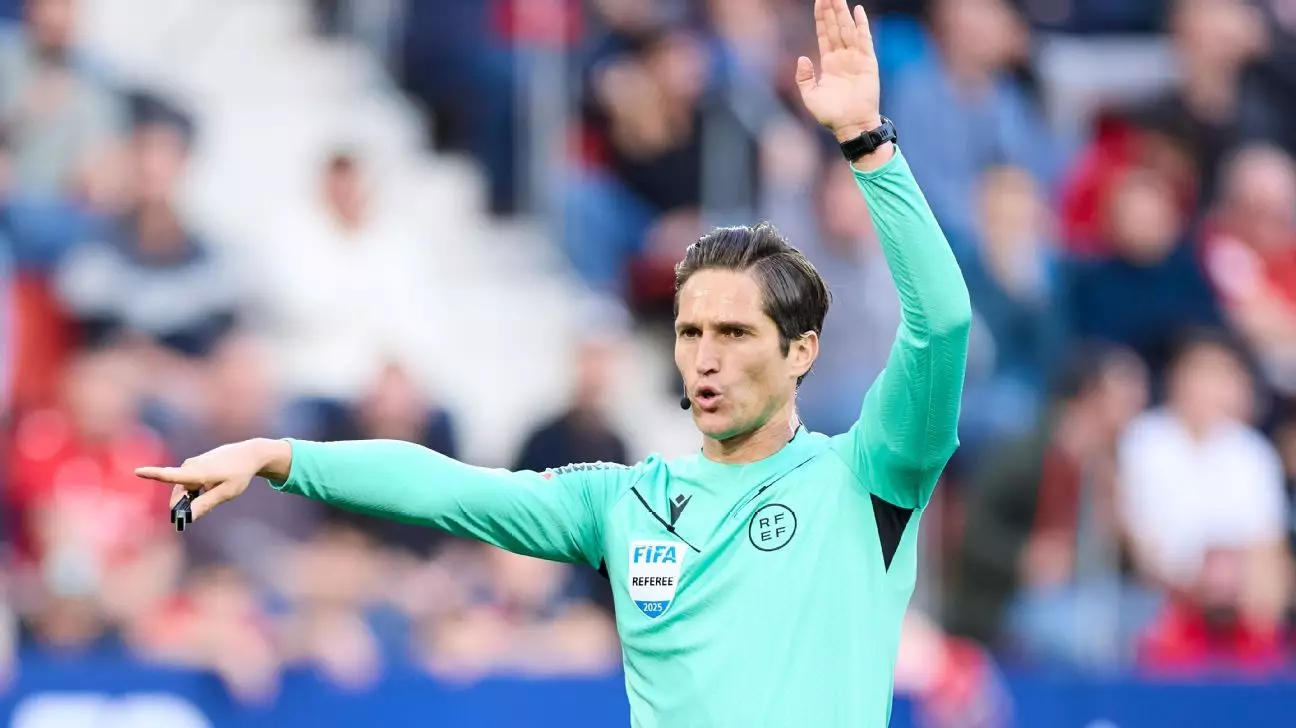The world of football is no stranger to controversy, and recent developments involving referee José Luis Munuera Montero have sparked considerable debate within Spanish football. Following his decision to send off Real Madrid’s Jude Bellingham during a tightly contested match against Osasuna—concluding in a perplexing 1-1 draw—the Spanish Football Federation (RFEF) announced that it would conduct an investigation into Munuera’s professional affiliations. The scrutiny stems from a report alleging business connections between Munuera and a company dubbed ‘Talentus Sports Speakers.’ This situation raises significant questions surrounding the integrity of officiating in football.
The complexity of this scenario is underscored by the mixed sentiments prevalent among clubs, players, and fans. Real Madrid’s management did not hold back their frustration, firmly believing that refereeing standards have reached a critical low. They demanded accountability, which is indicative of the growing tension that permeates La Liga, particularly concerning the implications of referee decisions on the outcomes of matches.
The reports suggesting a potential conflict of interest due to Munuera’s association with Talentus Sports Speakers claimed the company cooperated with several footballing entities, including LaLiga, UEFA, and various clubs. Such allegations inherently bring about concerns regarding impartiality and the governing bodies tasked with overseeing fair play in one of the world’s premier football leagues. Munuera, however, has staunchly defended his position, proclaiming that Talentus had never invoiced any sporting organization since its inception.
In a striking move indicative of the stakes involved, Munuera has threatened legal action against the media outlets disseminating these claims, accusing them of misrepresentation that could tarnish the reputation of the officiating community. This contention not only emphasizes Munuera’s resolve but also raises the specter of massive repercussions for the refereeing body if substantiated claims of financial impropriety come to light.
As the RFEF embarks on an analysis of the situation, one cannot ignore the broader implications for the football community. The atmosphere among clubs is increasingly polarized. Real Madrid’s vehement criticism of officiating has caught the attention of fellow clubs, notably Atlético Madrid, who have publicly supported the referees, heralding the need for mutual respect within the competition. Atlético’s recent statements regarding the ongoing scrutiny reflect a broader discomfort with Real Madrid’s combative approach, illustrating how divided opinions can ripple through the fabric of La Liga.
This discord can potentially undermine the essence of sportsmanship in football. The passionate nature of the sport breeds fervent reactions. However, when clubs begin to polarize over officiating standards, it can lead to an erosion of trust in the very ecosystem that governs the game. Decisions made on the pitch should remain the focal point of discussions, rather than the reputations of those tasked with ensuring fairness.
Navigating the aftermath of this controversy will require concerted efforts from the governing bodies to restore faith in refereeing. The RFEF’s commitment to transparency is crucial; its ongoing analysis must address any potential lapses in ethical judgment surrounding referees to avoid lingering doubts concerning fairness and integrity in football.
Moreover, it is essential for clubs, players, and fans to foster a more constructive dialogue surrounding officiating. Recognizing that refereeing is an imperfect art rather than a science will create an environment where officials are respected as individuals navigating high-pressure situations. The consequences of this controversy extend beyond a single match, necessitating a collective commitment from all stakeholders involved in the beautiful game.
In the tumultuous landscape of Spanish football, clarity, and unity will be pivotal in overcoming the turmoil currently afflicting the sport, helping to avoid repeating such allegations in the future.

Leave a Reply